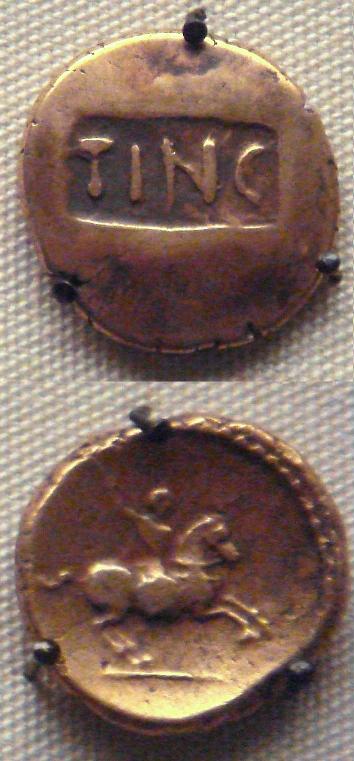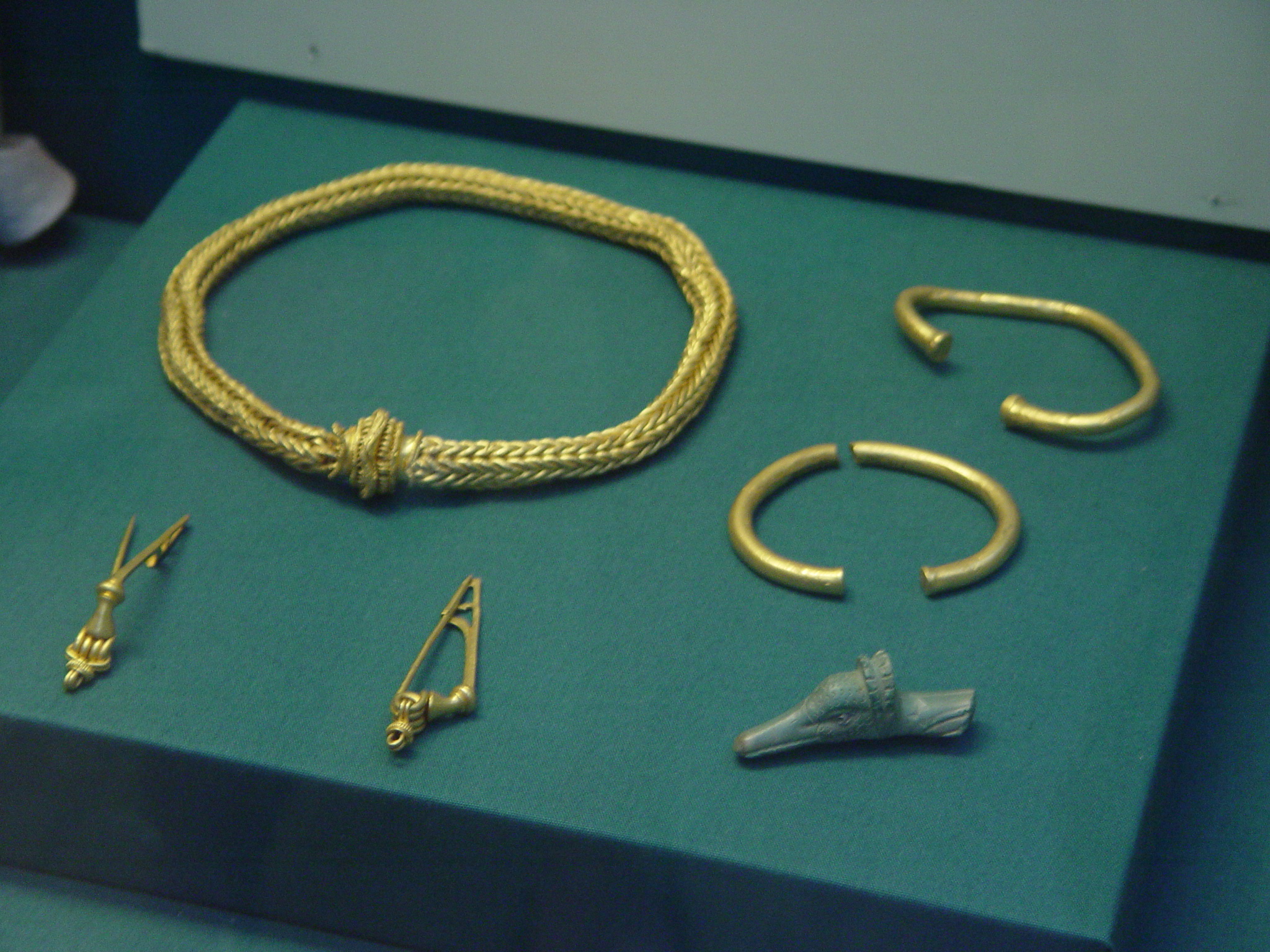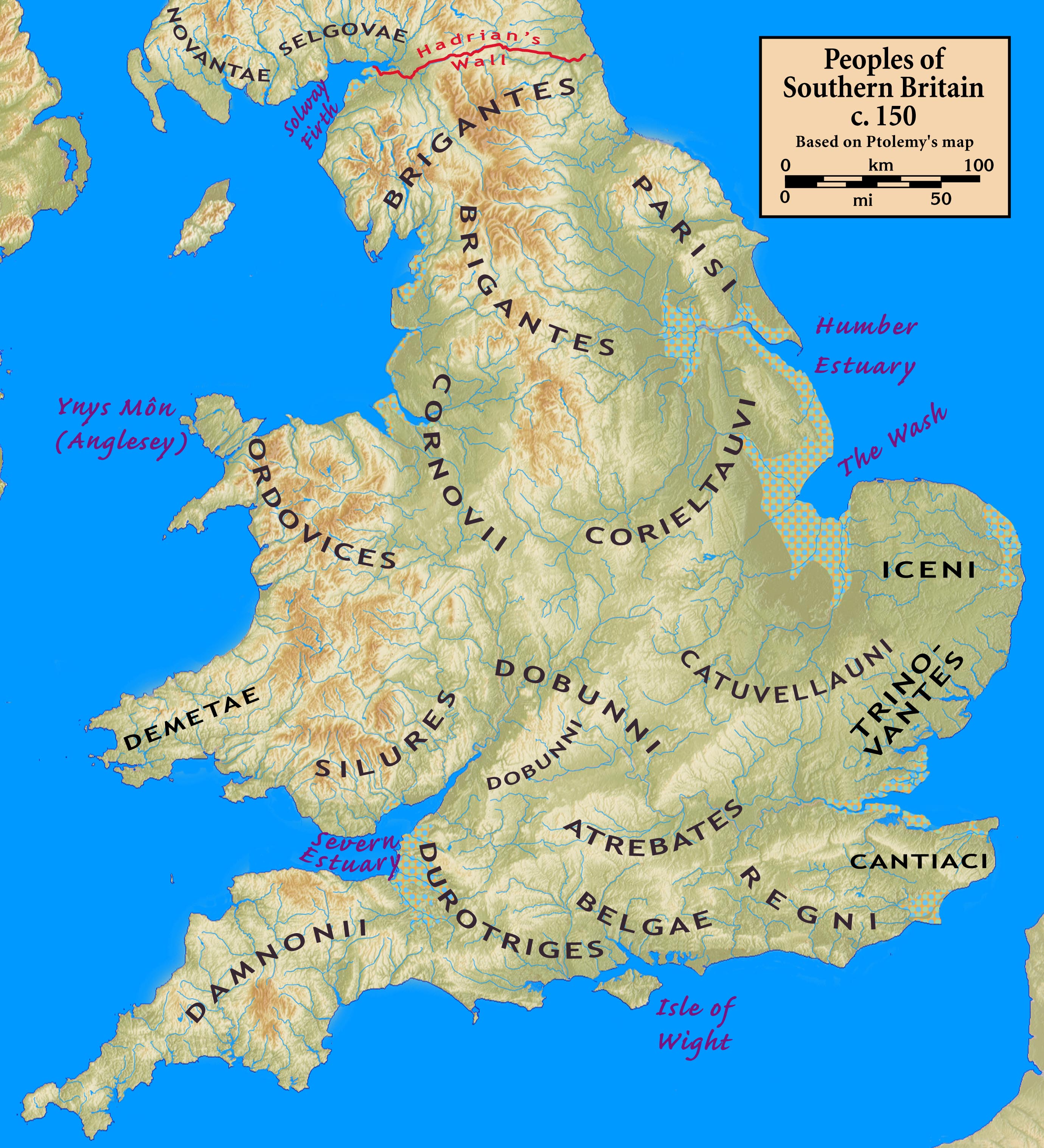|
Tincomarus
Tincomarus (a dithematic name form typical of insular and continental Celtic onomastics, analysable as ''tinco-'', perhaps a sort of fish f Latin ''tinca'', English ''tench''+ ''maro-'', "big") was a king of the Iron Age Belgic tribe of the Atrebates who lived in southern central Britain shortly before the Roman invasion. His name was previously reconstructed as Tincommius, based on abbreviated coin legends and a damaged mention in Augustus's '' Res Gestae'', but since 1996 coins have been discovered which give his full name. He was the son and heir of Commius and succeeded his father around 25-20 BC. Based on coin distribution it is possible that Tincomarus ruled in collaboration with his father for the last few years of Commius's life. Little is known of his reign although numismatic evidence suggests that he was more sympathetic to Rome than his father was in later years: the coins he issued much more closely resemble Roman types, and are made in such a way they may have come ... [...More Info...] [...Related Items...] OR: [Wikipedia] [Google] [Baidu] |
Atrebates
The Atrebates ( Gaulish: *''Atrebatis'', 'dwellers, land-owners, possessors of the soil') were a Belgic tribe of the Iron Age and the Roman period, originally dwelling in the Artois region. After the tribes of Gallia Belgica were defeated by Caesar in 57 BC, 4,000 Atrebates participated in the Battle of Alesia in 53, led by their chief Commius. They revolted again in 51 BC, after which they maintained a friendly relationship with Rome, as Commius received sovereignty over the neighbouring Morini. The quality of their woollens is still mentioned in 301 AD by Diocletian's Price Edict. An offshoot of the Belgic tribe probably entered Britain before 54 BC, where it was successively ruled by kings Commius, Tincommius, Eppillus and Verica. After 43 AD, only parts of the area were still controlled by king Claudius Cogidubnus, after which they fell under Roman power. Name They are mentioned as ''Atrebates'' by Caesar (mid-1st c. BC) and Pliny (1st c. AD), ''Atrebátioi'' (Ἀ ... [...More Info...] [...Related Items...] OR: [Wikipedia] [Google] [Baidu] |
Eppillus
Eppillus (Celtic languages, Celtic: "little horse") was the name of a Roman client kingdoms in Britain, Roman client king of the Atrebates tribe of the British Iron Age. He appears to have ruled part of the territory that had previously been held by Commius, the Gauls, Gaulish former ally of Julius Caesar who fled to Britain following the uprising of Vercingetorix, or possibly of his son. Eppillus is not mentioned in any historical sources. Coins bearing his name also bear the inscription COMMI.FILI which is generally read as ''Commios filius'' indicating at least a claim to be Commius's son. After Commius's death in about 20 BC, based on numismatic evidence, Eppillus seems to have ruled jointly with another ruler named Tincomarus. The COMMI.FILI inscription also appears on Tincomarus's coins suggesting they could have been brothers. Eppillus's capital was Noviomagus Reginorum (Chichester) in the south of the kingdom, while Tincomarus ruled from Calleva Atrebatum (Silchester) in th ... [...More Info...] [...Related Items...] OR: [Wikipedia] [Google] [Baidu] |
Commius
Commius (Commios, Comius, Comnios) was a king of the Belgic nation of the Atrebates, initially in Gaul, then in Britain, in the 1st century BC. Ally of Caesar When Julius Caesar conquered the Atrebates in Gaul in 57 BC, as recounted in his '' Commentarii de Bello Gallico'', he appointed Commius as king of the tribe. Before Caesar's first expedition to Britain in 55 BC, Commius was sent as Caesar's envoy to persuade the Britons not to resist him, as Caesar believed he would have influence on the island. However he was arrested as soon as he arrived. When the Britons failed to prevent Caesar from landing, Commius was handed over as part of the negotiations. Commius was able to provide a small detachment of cavalry from his tribe to help Caesar defeat further British attacks. During Caesar's second expedition to Britain Commius negotiated the surrender of the British leader Cassivellaunus. He remained Caesar's loyal client through the Gaulish revolts of 54 BC, and in return Cae ... [...More Info...] [...Related Items...] OR: [Wikipedia] [Google] [Baidu] |
Roman Client Kingdoms In Britain
The Roman client kingdoms in Britain were native tribes which chose to align themselves with the Roman Empire because they saw it as the best option for self-preservation or for protection from other hostile tribes. Alternatively, the Romans created (or enlisted) some client kingdoms when they felt influence without direct rule was desirable. Client kingdoms were ruled by client kings. In Latin these kings were referred to as ''rex sociusque et amicus'', which translates to "king, ally, and friend". The type of relationships between client kingdoms and Rome was reliant on the individual circumstances in each kingdom. The beginnings of the system are to be found in Caesar's re-enthroning of Mandubracius as king of the Trinovantes, who had been dethroned by Cassivellaunus and then aided Caesar's second invasion of Britain in 54 BC. The system further developed in the following hundred years, particularly under Augustus's influence, so that by the time of the Roman invasion in ... [...More Info...] [...Related Items...] OR: [Wikipedia] [Google] [Baidu] |
Roman Invasion Of Britain
The Roman conquest of Britain refers to the conquest of the island of Britain by occupying Roman forces. It began in earnest in AD 43 under Emperor Claudius, and was largely completed in the southern half of Britain by 87 when the Stanegate was established. Conquest of the far north and Scotland took longer with fluctuating success. The Roman army was generally recruited in Italia, Hispania, and Gaul. To control the English Channel they used the newly formed fleet. The Romans under their general Aulus Plautius first forced their way inland in several battles against British tribes, including the Battle of the Medway, the Battle of the Thames, and in later years Caratacus's last battle and the Roman conquest of Anglesey. Following a widespread uprising in AD 60 in which Boudica sacked Camulodunum, VerulamiumChurchill, ''A History of the English-Speaking Peoples'', p. 7 and Londinium, the Romans suppressed the rebellion in the Defeat of Boudica. They went o ... [...More Info...] [...Related Items...] OR: [Wikipedia] [Google] [Baidu] |
Briton Rulers
British people or Britons, also known colloquially as Brits, are the citizens of the United Kingdom of Great Britain and Northern Ireland, the British Overseas Territories, and the Crown dependencies.: British nationality law governs modern British citizenship and nationality, which can be acquired, for instance, by descent from British nationals. When used in a historical context, "British" or "Britons" can refer to the Ancient Britons, the indigenous inhabitants of Great Britain and Brittany, whose surviving members are the modern Welsh people, Cornish people, and Bretons. It also refers to citizens of the former British Empire, who settled in the country prior to 1973, and hold neither UK citizenship nor nationality. Though early assertions of being British date from the Late Middle Ages, the Union of the Crowns in 1603 and the creation of the Kingdom of Great Britain in 1707 triggered a sense of British national identity.. The notion of Britishness and a shared Briti ... [...More Info...] [...Related Items...] OR: [Wikipedia] [Google] [Baidu] |
Silchester
Silchester is a village and civil parish about north of Basingstoke in Hampshire. It is adjacent to the county boundary with Berkshire and about south-west of Reading. Silchester is most notable for the archaeological site and Roman town of Calleva Atrebatum, an Iron Age and later Atrebates Celtic settlement first occupied by the Romans in about AD 45, and which includes what is considered the best-preserved Roman wall in Great Britain and the remains of what may be one of the oldest Christian churches. Location The present village is centred on Silchester Common. It is about west of the Church of England parish church and former manor house (now Manor Farm), which are in the eastern part of the former Roman town. Local government Silchester is a civil parish with an elected parish council. Silchester parish is in the ward of Pamber and Silchester, part of Basingstoke and Deane District Council and of Hampshire County Council and all three councils are responsible f ... [...More Info...] [...Related Items...] OR: [Wikipedia] [Google] [Baidu] |
Calleva Atrebatum
Calleva Atrebatum ("Calleva of the Atrebates") was an Iron Age oppidum, the capital of the Atrebates tribe. It then became a walled town in the Roman province of Britannia, at a major crossroads of the roads of southern Britain. The modern village of Silchester in Hampshire, England, is about a mile (1.6 km) to the west of the site. The village's parish church of St Mary the Virgin is just within the ancient walls. Most of the site lies within the modern civil parish of Silchester, although the amphitheatre is in the adjoining civil parish of Mortimer West End. The whole of the site is within the local authority district of Basingstoke and Deane and the county of Hampshire. History Unusually for an Iron Age tribal town in Britain, its exact site was reused for the Roman town. The Romans changed the layout and defences. Calleva Atrebatum ("Calleva of the Atrebates") was an Iron Age settlement, as capital of the Atrebates tribe. It became a walled town in the Roman provi ... [...More Info...] [...Related Items...] OR: [Wikipedia] [Google] [Baidu] |
King Tincomarus Obses Diplomatic Hostage By Commius Df8wdfc
King is the title given to a male monarch in a variety of contexts. The female equivalent is queen, which title is also given to the consort of a king. *In the context of prehistory, antiquity and contemporary indigenous peoples, the title may refer to tribal kingship. Germanic kingship is cognate with Indo-European traditions of tribal rulership (c.f. Indic ''rājan'', Gothic '' reiks'', and Old Irish '' rí'', etc.). *In the context of classical antiquity, king may translate in Latin as '' rex'' and in Greek as ''archon'' or '' basileus''. *In classical European feudalism, the title of ''king'' as the ruler of a ''kingdom'' is understood to be the highest rank in the feudal order, potentially subject, at least nominally, only to an emperor (harking back to the client kings of the Roman Republic and Roman Empire). *In a modern context, the title may refer to the ruler of one of a number of modern monarchies (either absolute or constitutional). The title of ''king'' is u ... [...More Info...] [...Related Items...] OR: [Wikipedia] [Google] [Baidu] |
Verica
Verica (early 1st century AD) was a British client king of the Roman Empire in the years preceding the Claudian invasion of 43 AD. From his coinage, he appears to have been king of the, probably Belgic, Atrebates tribe and a son of Commius. The distribution of his coins also shows that Verica's kingdom was centred on modern Sussex and east Hampshire, and its capital would have been in or close to what became the Roman Noviomagus Reginorum (modern Chichester). He succeeded his elder brother Eppillus as king in about 15 AD, and may also have reigned over the northern Atrebatic kingdom at Calleva Atrebatum, today called Silchester. He was recognised as '' rex'' by Rome and appears to have had friendly trade and diplomatic links with the empire. His territory was pressed from the east by the Catuvellauni, led by Epaticcus, brother of Cunobelinus, who conquered Calleva in about 25 AD. After Epaticcus's death ca. 35 AD Verica regained some territory, but Cunobelinus's son Caratac ... [...More Info...] [...Related Items...] OR: [Wikipedia] [Google] [Baidu] |
Numidia
Numidia ( Berber: ''Inumiden''; 202–40 BC) was the ancient kingdom of the Numidians located in northwest Africa, initially comprising the territory that now makes up modern-day Algeria, but later expanding across what is today known as Tunisia, Libya, and some parts of Morocco. The polity was originally divided between the Massylii in the east and the Masaesyli in the west. During the Second Punic War (218–201 BC), Masinissa, king of the Massylii, defeated Syphax of the Masaesyli to unify Numidia into one kingdom. The kingdom began as a sovereign state and later alternated between being a Roman province and a Roman client state. Numidia, at its largest extent, was bordered by Mauretania to the west, at the Moulouya River, Africa Proconsularis to the east, the Mediterranean Sea to the north, and the Sahara to the south. It was one of the first major states in the history of Algeria and the Berbers. History Independence The Greek historians referred to these peopl ... [...More Info...] [...Related Items...] OR: [Wikipedia] [Google] [Baidu] |






